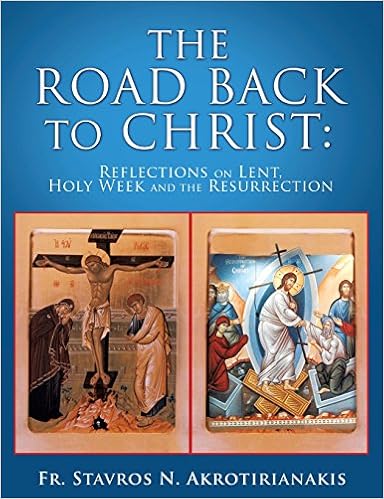Friday of the Second Week of Lent
And the Lord said to Satan, "Have you considered my servant Job, that there is none like him on the earth, a blameless and upright man who fears God and turns away from evil?" Then Satan answered the Lord, "Does Job fear God for naught? Hast thou not put a hedge about him and his house and all that he has,. on every side? Thou hast blessed the work of his hands, and his possessions have increased in the land. But put forth Thy hand now, and touch all that he has, and he will curse Thee to Thy face" . .. While he was yet speaking, there came another, and said, "Your sons and daughters were eating and drinking wine in their eldest brother's house; and behold, a great wind came across the wilderness, and struck the four corners of the house, and it fell upon the young people, and they are dead; and I alone have escaped to tell you." Then Job arose, and rent his robe, and shaved his head, and fell upon the ground, and worshiped. And he said, "Naked I came from my mother's womb, and naked shall I return; the LQrd gave, and the Lord has taken away; blessed be the name of the Lord." In all this Job did not sin or charge God with wrong.
Job 1:8-11; 18-22
(Read at the Pre-Sanctified Liturgies of Holy Monday [1:1-12] and Holy Tuesday [1:13-22])
Many of us have heard the phrase, "The patience of Job." It refers to all of the trials and tribulations that afflicted Job and how he stayed faithful to God. Though, having read the book of Job, I can't exactly say that he always stayed patient. There were times that even Job was lamenting his lot in life.
For those unfamiliar with the book of Job, it consists of 41 chapters. On Holy Monday, Holy Tuesday, and Holy Wednesday at the Pre-Sanctified Liturgy, we read from the first two chapters of the book of Job. At the Vesperal Liturgy on Holy Thursday and the Vespers on Good Friday afternoon, we read from the last chapters.
Job, as we learn, was a "blameless and upright man:' who walked in the way of the Lord. The Lord had blessed him with many possessions and a nice family. Satan one day approached God, challenging God that if God allowed Satan to ruin Job's life, that Job would eventually tum against God. So, God allowed Satan to afflict Job with all kinds of bad things, He only instructed Satan that he couldn't kill Job. So, Satan affiictedJob by taking his possessions, destroying his home, destroying his health and killing Job's children. Job's wife even told him to curse God and end his life, but Job remained faithful to God. In all that happened to him, "Job did not sin or charge God with wrong."
The first two chapters of Job are where God allows Satan to attack Job. From Chapter 3 through Chapter 41 (yes, for 39 chapters!), Job laments his situation. Privately, his heart is broken. Then Job's "friends" come to give him advice. They tell him to blame God, or to blame himself for his sufferings, yet Job, who has lost everything, remains faithful to God, even though he doesn't quite understand why God let all of these bad things happen to him. He believes that God has a plan for him, even though he doesn't understand what that plan is. Who could? With all the death and destruction that came upon Job's life, how could God possibly allow all of that?
At some point in life, we can probably all relate to Job. Life gets hard, our outlook seems bleak, we feel as if we lose more than we win, we might even wonder if we have fallen out of favor with God or if God has abandoned us. We've already learned about the importance of having good friends, and good friends who are Christian, who pick us up when we are down. Unfortunately for Job, his friends added to his misery by challenging him to give up on God.
So, after two chapters of affliction, and thirty-nine chapters ofJob's lament, during which he is sometimes frustrated but always faithful, we hear about Job's reward. God significantly rewards Job's faithfulness. Joh confesses to God that he is sorry for not being even more faithful. Job's confession is mature and humble. It acknowledges that God has plans for us that may be hard for us to understand, and that perhaps do not match with the plans we have for ourselves. Job says to God:
'I know that Thou canst do all things, and that no purpose of Thine can be thwarted. Who is this that hides counsel without knowledge? There I have uttered what I did not understand, things too wonderful for me, which I did not know. Hear, and I will speak; I will question You, and You declare to me. I had heard of Thee by the hearing of the ear, but now my eye sees Thee; therefore I despise myself, and repent in dust and ashes" (Job 42: 1-6).
In the end, we see that God was faithful to Job. God restored Job's fortune, giving him twice as much as he had had before.
Many people's lives resemble Job's life, at least at some point. It's hard even to find a silver lining sometimes when 'everything is going wrong, but the lesson ofJob mimics the Passion of Christ, who stayed faithful to God even as He was being tortured and murdered. The lesson for us is the same-stay faithful at all times to the Lord, and He will reward you. Perhaps, not in your time or in your way, but He will reward us abundantly in His time, in His way. Our goal should be the faithfulness of Job. Ideally in no situation should we curse the name of the Lord, but rather trust in His plans, as well as His reward to those who are faithful to Him.
0 Lord and Master of my life,
deliver me from the spirit of indolence,
meddling, vain ambition, and idle talk.
Grant to me, Your servant,
the spirit of prudence, humility, patience and love.
Yea, Lord and King; grant me that I may see my own faults, and to not judge my brother.
For You are blessed to the ages of ages. Amen.
Prayer of St. Ephraim the Syrian
(Prayed throughout Lent and at the Bridegroom Services, Trans by Fr. George Papadeas)
Be patient in your "trials" today!
We encourage you to participate in this journey guided by Fr. Stavros in two ways:
Purchase the book "The Road Back to Christ: Reflections on Lent, Holy Week and the Resurrection" by Fr. Stavros N. Akrotirianakis
Join the Prayer Team Daily Devotion email list and receive a reflection like this in your inbox every morning
About Great Lent, Holy Week, and Pascha
There is a 19 Sunday (18 week) period of time each year in the Orthodox Christian Church that surrounds the Feast of Pascha (Easter). The first three weeks, including four Sundays, are called the Triodion, or pre-Lenten period. The next forty days, which includes nearly six weeks and five Sundays, is called Great Lent. In the Orthodox Church, Great Lent begins on a Monday called Clean Monday, rather than Ash Wednesday, as it does in other churches. Great Lent ends on a Friday.
Holy Week follows, along with the Great and Holy Week.
The Feast of the Resurrection is called Pascha and it begins a forty-day period of celebration. After forty days, the church celebrates the Feast of the Ascension. Ten days later (fifty days after the Resurrection), the church celebrates the Feast of Pentecost. The Sunday after Pentecost is the Feast of All Saints. This ends this cycle of "movable feasts" (called this because their date moves every year), which surround the feast of Pascha.
 About "The Road Back to Christ"
About "The Road Back to Christ"
The Road Back to Christ: Reflections on Lent, Holy Week and the Resurrection is a series of short daily reflections on the scripture readings of Holy Week and the accounts of the Resurrection and post-Resurrection appearances of Christ. Designed to guide its readers through the journey, it will both inspire and reinvigorate your faith through meditation, prayer, and a deeper understanding of the Passion and Resurrection of Jesus Christ.
About Fr. Stavros
Fr. Stavros Akrotirianakis is the Proistamenos (Presiding Priest) at St. John the Baptist Greek Orthodox Church in Tampa, FL.
